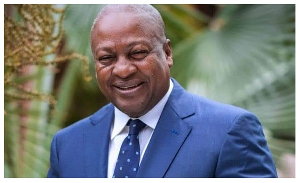In a world where economic landscapes are constantly evolving, Ghana stands at a pivotal crossroads, inspired by the ambitious vision of the 2024 presidential candidate of the National Democratic Congress (NDC), former President John Dramani Mahama.
His compelling blueprint for revitalising the nation centres around the concept of a 24-hour economy—an innovative framework designed to maximise productivity, foster job creation, and elevate the standard of living for Ghanaians.
As Mahama articulates his vision, he calls for a transformation that empowers every sector, from agriculture to technology, encouraging entrepreneurship and harnessing the potential of a youthful workforce.
This article and the next few ones will delve into Mahama's strategic initiatives, exploring how they aim to reshape Ghana's economic future, stimulate growth, and create sustainable employment opportunities. Please join me as I unpack the nuances of this visionary plan and its implications for the nation’s prosperity and resilience in an increasingly competitive global market.
In recent years, Ghana has faced a myriad of economic challenges that have tested the resilience of its people and institutions. From inflationary pressures to high unemployment rates, the need for a robust economic revival has never been more pressing.
In this context, the vision articulated by former President John Dramani Mahama for a 24-hour economy presents a beacon of hope. Economic revitalisation is not merely a goal; it is essential for the sustainability of Ghana's future.
A thriving economy is the backbone of a prosperous nation, providing citizens with the opportunity for financial stability, improved living standards, and enhanced social services.
Mahama's vision seeks to harness the potential of Ghana's natural resources, skilled workforce, and expanding technological landscape to create a dynamic economy that operates around the clock. This approach not only aims to stimulate job creation but also aspires to foster innovation and entrepreneurship among the populace.
By reinvigorating key sectors such as agriculture, manufacturing, and services, Ghana can move closer to realising its full economic potential. The implications of a 24-hour economy are, therefore, profound: it promises to generate countless jobs, attract foreign investment, and ultimately contribute to a more equitable distribution of income.
As I delve deeper into this vision, I will explore the strategies that can be adopted to facilitate this transformation, the pivotal role of collaboration among government, private sector, and civil society in actualising Mahama's ambitious plan for a revitalised Ghana.
The journey toward economic revitalisation requires a collective effort, and it begins with a vote for Mahama on December 7.
Opinions of Sunday, 8 September 2024
Columnist: Anthony Obeng Afrane



















